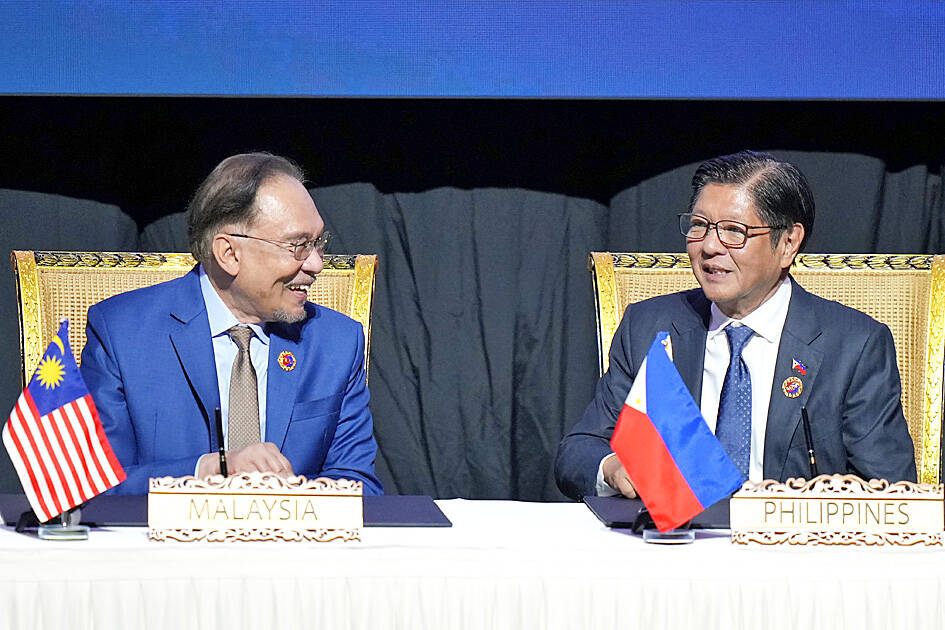Southeast Asian leaders met yesterday in Kuala Lumpur for their first summit since US President Donald Trump’s tariffs upended global economic norms, with the trade-dependent nations expected to issue a joint message of deep concern.
ASEAN was also attempting to increase pressure on Myanmar’s military junta and iron out remaining issues with East Timor’s application to join the bloc.
ASEAN’s strategy of nurturing diverse economic alliances was on full display as Chinese Premier Li Qiang (李強) touched down in the Malaysian capital, a day ahead of talks with the bloc and Gulf states.

Photo: AP
In opening remarks given to media, but not delivered in his speech, Malaysian Prime Minister Anwar Ibrahim said: “A transition in the geopolitical order is underway and the global trading system is under further strain, with the recent imposition of US unilateral tariffs.”
“Protectionism is resurging as we bear witness to multilateralism breaking apart at the seams,” he added.
Trump cast international markets into turmoil last month when he announced wide-ranging tariffs, before agreeing to pause them for most nations for 90 days. Bilateral talks between ASEAN member states and Washington are in progress, but the bloc is still presenting a united front, according to Malaysia, which holds the rotating ASEAN chair this year.
According to a draft statement, ASEAN would express “deep concern ... over the imposition of unilateral tariff measures,” saying they “pose complex and multidimensional challenges” to the bloc, but ASEAN said earlier this year it would not impose retaliatory tariffs on the US. Instead, it is looking at broadening its scope with other trading blocs, including the EU, as well as beefing up trade between member states, the Malaysian trade minister said.
Today’s talks with Li and the Gulf Cooperation Council — a bloc made up of Bahrain, Kuwait, Oman, Qatar, Saudi Arabia and the United Arab Emirates — underscores the effort to maintain a broad network of trading partners.
“It’s not just a photo-op. It actually demonstrates how ASEAN is attempting to engage strategically with various blocs, a strategy we might term multialignment diplomacy,” said Khoo Ying Hooi from Malaya University.
Anwar yesterday said that he had written to Trump to request an ASEAN-US summit this year — showing “we observe seriously the spirit of centrality.”
ASEAN’s relationship with rival power China is hardly uncomplicated either. Philippine President Ferdinand Marcos Jr told his regional counterparts there was an “urgent need” to adopt a legally binding code of conduct in the South China Sea. Beijing has territorial disputes in the area with five ASEAN member states, with China and the Philippines having engaged in months of confrontations in the contested waters.
The adoption of a code of conduct should be accelerated “to safeguard maritime rights, promote stability and prevent miscalculations at sea,” Marcos said, according to a copy of his speech released by the Philippine government.
Malaysia on Sunday tried to increase pressure on member state Myanmar’s junta, whose leaders are barred from ASEAN summits over a lack of progress on a five-point peace deal agreed by the bloc in 2021.

MAKING WAVES: China’s maritime militia could become a nontraditional threat in war, clogging up shipping lanes to prevent US or Japanese intervention, a report said About 1,900 Chinese ships flying flags of convenience and fishing vessels that participated in China’s military exercises around Taiwan last month and in January last year have been listed for monitoring, Coast Guard Administration (CGA) Deputy Director-General Hsieh Ching-chin (謝慶欽) said yesterday. Following amendments to the Commercial Port Act (商港法) and the Law of Ships (船舶法) last month, the CGA can designate possible berthing areas or deny ports of call for vessels suspected of loitering around areas where undersea cables can be accessed, Oceans Affairs Council Minister Kuan Bi-ling (管碧玲) said. The list of suspected ships, originally 300, had risen to about

DAREDEVIL: Honnold said it had always been a dream of his to climb Taipei 101, while a Netflix producer said the skyscraper was ‘a real icon of this country’ US climber Alex Honnold yesterday took on Taiwan’s tallest building, becoming the first person to scale Taipei 101 without a rope, harness or safety net. Hundreds of spectators gathered at the base of the 101-story skyscraper to watch Honnold, 40, embark on his daredevil feat, which was also broadcast live on Netflix. Dressed in a red T-shirt and yellow custom-made climbing shoes, Honnold swiftly moved up the southeast face of the glass and steel building. At one point, he stepped onto a platform midway up to wave down at fans and onlookers who were taking photos. People watching from inside

Japan’s strategic alliance with the US would collapse if Tokyo were to turn away from a conflict in Taiwan, Japanese Prime Minister Sanae Takaichi said yesterday, but distanced herself from previous comments that suggested a possible military response in such an event. Takaichi expressed her latest views on a nationally broadcast TV program late on Monday, where an opposition party leader criticized her for igniting tensions with China with the earlier remarks. Ties between Japan and China have sunk to the worst level in years after Takaichi said in November that a hypothetical Chinese attack on Taiwan could bring about a Japanese

The WHO ignored early COVID-19 warnings from Taiwan, US Deputy Secretary of Health and Human Services Jim O’Neill said on Friday, as part of justification for Washington withdrawing from the global health body. US Secretary of State Marco Rubio on Thursday said that the US was pulling out of the UN agency, as it failed to fulfill its responsibilities during the COVID-19 pandemic. The WHO “ignored early COVID warnings from Taiwan in 2019 by pretending Taiwan did not exist, O’Neill wrote on X on Friday, Taiwan time. “It ignored rigorous science and promoted lockdowns.” The US will “continue international coordination on infectious